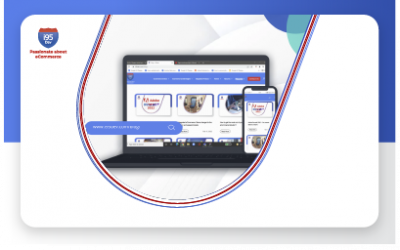July 11, 2022
Busting top 10 B2B eCommerce myths: 2022-2023 Edition

It’s 2022, but whenever one thinks about eCommerce, they automatically assume the B2C model. However, given the scale and reach among the internet-savvy masses, it would be inappropriate to presume that B2B organizations cannot leverage it.
Let’s get an idea of where B2B eCommerce stands in today’s date:
The worldwide business-to-business eCommerce industry was worth USD 6,883.47 billion in 2021 and is expected to grow at 19.7% CAGR during the forecast period 2022-2030.

By 2025, 80% of B2B sales will be digital, and there is no way you can miss the train, especially after rapid digitization in the post-Covid world.
As many B2B organizations begin digitizing their business processes and adapting to their online journey via eCommerce, plenty of myths continue to surround them.
In this blog, we have debunked the top 10 B2B eCommerce myths once and for all.
1. Sharing a few amateur Instagram reels and Tweeting is solid digital marketing for B2B eCommerce marketing
No, B2B eCommerce digital marketing or any sort of digital marketing is much more than posting a couple of times. However, indeed, a lot of wholesalers and manufacturers don’t know how to get started.
But without a proper digital marketing strategy and, more importantly, flawless execution, it doesn’t work for you despite less competition.
Get an excellent digital marketing team that helps you establish your online identity, target the right audience, grow engagement, and convert B2B leads.
2. With a B2B eCommerce website in place, you don’t need Sales Representatives at all
Sales representatives will continue to be essential to your team despite building an eCommerce website since B2B sales are pretty complicated.
While the below image describes the difficulties encountered by b2B buyers, it is noteworthy that, unlike B2C, B2B purchases have lasting effects on buyers.
An automated sales funnel will not work best for you since B2B purchase decisions are driven by trust and require human interaction.
Instead, you can go for partial automation of your sales funnel, and up on maturing a lead, you can assign them to your sales representatives for closing.
Remember, there are a lot of case-specific reservations and requirements which cannot be addressed through any content or marketing strategy- human intervention is a must with B2B eCommerce.
3. You can’t start a business with big-ticket clients right away
Before you assume that big-ticket clients would always prefer trusted names within their networks over eCommerce, have a look at these statistics:
- Millennials make up 73% of the B2B buying process decision-makers today.
- During the research phase of their buying journey, 89% of B2B buyers proactively use the Internet.
Thus, it is noteworthy that the Internet is fast becoming one of the essential means of product education and sales in the B2B landscape.
As a rule of thumb, your B2B eCommerce website must have impactful thought leadership content and resources to help you win the trust of big-ticket clients.
4. Your website needs to look old school since its a B2B eCommerce
Though a lot of big names in the industry might have a sluggish, archaic website, you don’t need to stick to the same old, boring designs.
While it may serve the purpose of maintaining brand recognition to them, as a new business on the Internet, your website must be exciting to your visitors.
Ensure you employ an AI-powered chatbot to help visitors navigate and get important information.
On top of that, you must also ensure that your website has an engaging UI-UX design and follows principles of visual hierarchy to provide the right aesthetic feel.
5. An eCommerce website cannot do justice to B2B pricing
While it may appear valid at face value, B2B pricing can be well-accommodated on eCommerce websites.
For starters, you must enable account-based pricing catalogs since they utilize previously collected information to generate the right product and quantitative suggestions.
Also, you can loop the sales representatives in the process for custom quotes and requirement evaluation to extend a seamless buying experience.
You must not avoid using multiple filters and information fields as long as they are tactically sequenced, as B2B purchases are assumed to be more comprehensive than online shopping.
6. You can digitize and automate customer service for your B2B eCommerce website
Just as sales cannot be fully automated regarding B2B eCommerce, customer servicing also requires timely human intervention.
While you must have a self-service portal and AI chatbot to help your visitors and customers with instant information, customer service representatives are a must.
Slow customer service is one of the significant B2B eCommerce pain points; thus, you must have a thorough idea of the touchpoints where customer service representatives are necessary.
click here
7. Building a proper B2B eCommerce website is too costly
Indeed, a B2B eCommerce website is typically challenging to build, but it isn’t exceptionally costly.
However, you must opt for a good vendor who will not only create the right website structure but also provide you with B2B eCommerce-ERP integration services.
This way, you can convert the inbound traffic and automate all sales and post-sales tasks to an enormous extent.
Also, it is noteworthy that the vendor must provide you with maintenance and troubleshooting services since downtime could heavily dent your pocket.
8. You can skip Mobile Optimization in your B2B eCommerce website
As we mentioned earlier, assuming that the B2B purchase cycle is strictly limited to computers would be naive.
As a matter of fact, an increasing number of B2B purchase cycles begin on smartphones and later loop between multiple devices.
Therefore, your website mustn’t only look good on phone screens but provide excellent navigation and functional value to the users.
9. You can’t develop personal relationships with B2B eCommerce
It is no secret that a significant portion of B2B transactions revolves around the personal relationships between executives, and an eCommerce website can be incredibly supportive in the process.
Among the prevalent concerns of B2B buyers, lack of instant information can be attributed as the biggest deal-breaker.
In fact, having a content-rich eCommerce website that facilitates all necessary information and helps visitors keep themselves updated with market insights is tremendously beneficial.
This way, you can be a resourceful stakeholder in their business activities and, in turn, develop stronger ties with your customers.
10. Developing a B2B eCommerce website is a one-time job
Unlike many other businesses, it wouldn’t be wise to develop and deploy a B2B eCommerce website never to have it reworked.
As time passes, you will experience changes in user behavior, preferences, product life cycles, competitors, and even the market at large.
Also, your organization and its goals will evolve with time, making it necessary to reflect these changes on the website.
Thus, you must consider changes as found appropriate on a timely basis to keep your B2B eCommerce website relevant to your business and the target audience.
Wrap Up
We hope that we cleared most of your myths but if you need any guidance for your B2B eCommerce website, feel free to get in touch with i95Dev.
We have a seasoned team of technical and business process experts that will help you with the best-in-class solutions to help you thrive in today’s volatile markets.
Recent Blogs
Why Shopify and NetSuite Integration is Crucial for Your eCommerce Success
Why Shopify and NetSuite Integration is Crucial for Your eCommerce Success Author Category Share The digital transformation of commerce is accelerating. According to Gartner, by 2025, a...
Streamlining eCommerce Business with Adobe Commerce (Magento) and NetSuite Integration
Streamlining eCommerce Business with Adobe Commerce (Magento) and NetSuite Integration Author Category Share In the ever-evolving world of commerce, managing eCommerce operations can feel...
B2B e-commerce – How Home Depot is leading the game
B2B eCommerce – How Home Depot is leading the game Author Category Share The home improvement industry has undergone a remarkable transformation, and at the heart of this change is the rise...







